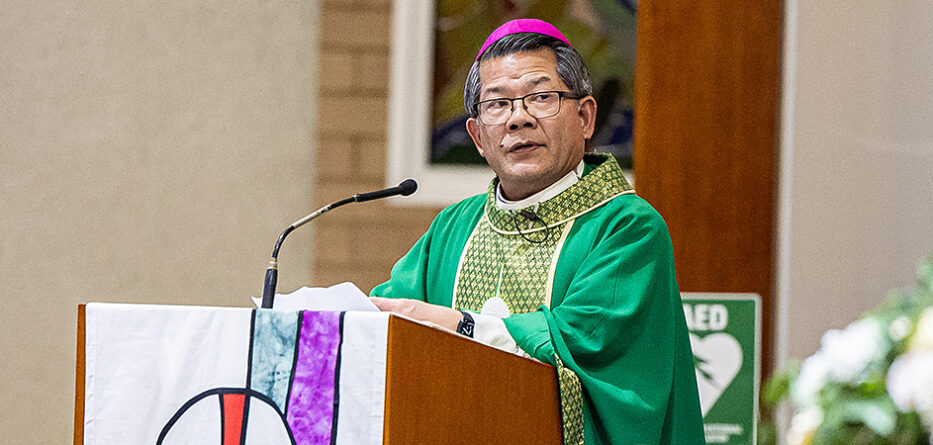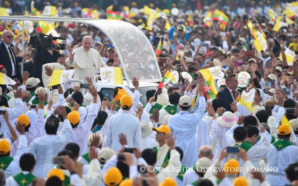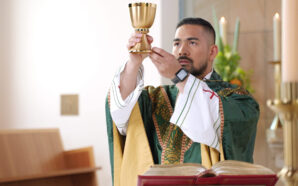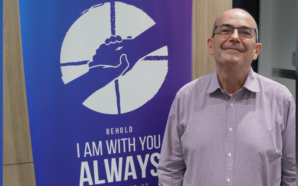Most Reverend Vincent Long Van Nguyen OFM Conv DD STL, Bishop of Parramatta
Homily for the 19th Sunday in Ordinary Time, Year B and the launch of the Diocesan Pastoral Plan 2024-2028 at St Nicholas of Myra Parish, Penrith
Readings: 1 Kings 19:4-8; Psalm 33(34):2-9; Ephesians 4:30 – 5:2; John 6:41-51
10 August 2024
Beginning the journey with the Diocesan Plan for a Synodal Church
Dear sisters and brothers,
It is with hope and confidence that we have begun yet another milestone in the life of our young, richly-diverse and dynamic diocese. Together, we have launched the new Pastoral Plan for a synodal Church, thus committing ourselves to walking the path towards greater communion, participation and mission. In doing so, we have responded to the invitation of Pope Francis to rebuild and revitalise the Church with renewed discipleship, faithful to our calling as followers of Jesus Christ, as well as responsive to the promptings of the Holy Spirit alive through the signs of the times.
We are all learners in this synodal Church. There is a certain sense of vulnerability as we let go of the old ways of dominance, power and control which have been the features of Christendom or its various iterations. Humbly, but also confidently, we learn to embody the Gospel afresh; we learn to listen, discern and align ourselves to the direction of the Holy Spirit. By being Church in this new way, we hope to become a community of empowerment, a model society for our lived reality, and an effective vehicle of the Good News for the poor, the planet and all God’s creation.
The Word of God this 19th Sunday strengthens us in our journey towards the future. We are never abandoned to our own devices alone. The God of the journey always accompanies and empowers us in our quest to embody his love and to do his bidding in the midst of a changing world.
In the first reading today, we hear the story of the prophet Elijah who was on the run for his life. He had had moments of triumph and glory. He had killed the false prophets and he had witnessed God’s revelation on Mount Carmel through a gentle breeze. However, as the enemies pursued him relentlessly, he wanted to give up, not only the journey but the mission he had been entrusted with.
This sense of disillusionment was similar to that of the people of Israel facing hunger and thirst in the wilderness. But just as the Israelites were strengthened by the manna, Elijah was also replenished. He was told “get up and eat” the food that had been prepared by an angel. Elijah obliged and he was given a new lease of life. The food gave him not only the nourishment his body craved for but also the hope his soul needed. As a result, he was able to accomplish his journey and his mission.
In the Gospel, Jesus points to the source of nourishment, which would enable the people to find true fulfilment. Following the miracle of the loaves and fishes, Jesus had alluded to a deeper level of nourishment. The people, however, failed to understand the meaning of the new manna. Instead of rising to a new level of consciousness, they were still stuck in a shallow search for temporary relief. They wanted more of the same old bread. They were in a parallel universe. The old manna sustained the pilgrims on their way to the promised land. The new manna, which was Jesus himself, would be the true source of nourishment for those who embark on the journey of discipleship. “The bread I shall give is my flesh for the life of the world.” It is a food that transforms us into his instruments and agents of change.
Dear brothers and sisters,
“What keeps us going? What replenishes our energy and sustains our hope? How can we as the Church and the living Body of Christ move towards a better future?” These and similar questions continue to be asked as we face the long and hard journey before us. The Word of God invites us to avail ourselves of God’s gift of nourishment in Christ. It is the Eucharist that is the anchor of our hope. At the Last Supper, the disciples received a hope beyond all they could have imagined: the body and blood of Christ as a pledge of His everlasting love. In the light of this eucharistic hope, all their conflicting hopes find a common home.
In living out the vision of a synodal Church, we shall have moments of tension and conflicting hopes. Let us not be afraid to share them and to find our common ground through Christ’s redemptive suffering, death and resurrection. Let us allow Christ to permeate every fibre of our being. Let every aspect of our life be influenced by Him so that we become transformed in our attitude and behaviour.
We have great challenges going forward. However, we have the assurance of the Lord who promised to be with us always to the end of time. This consciousness, deepened by our lived experience of the synodal Church, has been the inspiration for the vision and theme for our pastoral plan: “Behold, I am with you always”.
As the Carpenters used to sing “We have only just begun to live”. Indeed, our journey as a synodal Church has only just begun. But like the disciples on the road to Emmaus, we are strengthened by the encounter with Jesus and by the Eucharistic hope in which we are anchored. May the seeds we have sown today bear fruit for generations to come. May Mary who listened to God’s Word and acted in sync with the Holy Spirit accompany us on the road of discipleship and witness.








